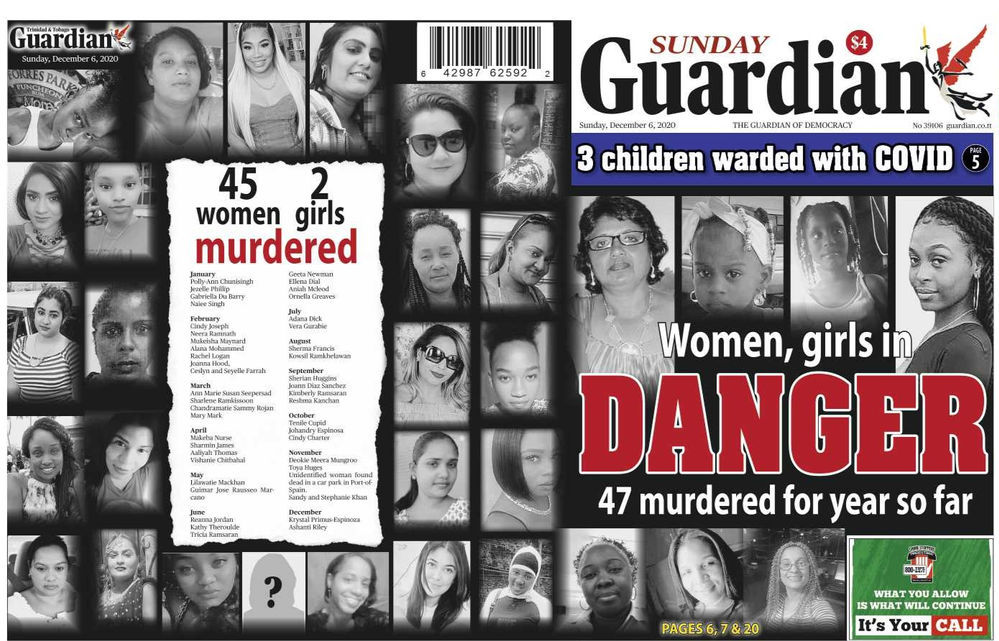

One of the most joyful months of the year has already been plunged into tragedy as the discovery of Ashanti Riley’s body rocked T&T over the weekend. The 18-year-old schoolgirl is the second woman to be murdered for the month of December and she is among 47 women and girls who have been murdered so far for the year 2020. This figure includes two children under the age of 10 and one woman who has yet to be identified.
These were 47 mothers, daughters, sisters and friends all undeserving of such tragic ends to their lives at the hands of spouses, relatives and strangers. Though the latest murder of the teenager has hit a public nerve, with Prime Minister Dr Keith Rowley describing the loss of Riley as ‘a national pain’, the incident is far from isolated.
The local statistics on violence against women are staggering. According to the Trinidad and Tobago Police Service, there were 352 reported incidents of rape, incest and sexual offences in 2019 and up to 332 reported incidents this year up to October 31st, 2020. The Coalition Against Domestic Violence reports than between 2005 and 2015, 300 women were murdered in T&T. In 2017, this number dropped to 52 but 43 of these cases were linked to domestic violence.
The unfortunate reality of this issue is that there are still many more unreported incidents of women and girls in T&T suffering at the hands of their abusers. Speaking to the Trinidad Guardian Newspaper, General Manager of the Coalition Against Domestic Violence (CADV) Sabrina Mowlah-Baksh points out that the COVID-19 pandemic and its stay-at-home restrictions have worsened the situation for many victims.
“The home space is not as safe as it ought to be for many. The fact is that women and girls continue to be harmed by those closest to them: partners, fathers, uncles, brothers, trusted family friends, neighbours.”

It must also be noted that these recent tragic incidents have happened during the United Nation’s 16 Days of Activism Against Gender-Based Violence. This initiative, which is part of the UN Secretary-General Campaign to end domestic violence against women, has seen support from local organizations including The UWI Institute for Gender and Development Studies, ECLAC, The High Commission of Canada to T&T, Feminitt and the Trinidad and Tobago Chamber of Industry and Commerce.
The journey to better protecting our women and girls is long and winding with more obstacles than their lives can afford. At the start of this year, the Trinidad and Tobago Police Service stepped up to the challenge with the establishment of its Gender-Based Violence Unit. But there is still so much that can be done. The International Women’s Resource Network (IWRN) continues its call for a National Registry on Domestic and Gender-Based Violence and there has been public outcry over the government’s failure to pass legislation that allows women to carry non-lethal weapons for protection.
Earlier this year, Chair of the Catholic Commission for Social Justice (CCSJ) Leela Ramdeen urged citizens to speak up.
“This heinous form of oppression/gender-based violence is an affront to the inherent dignity of each woman/girl and diminishes/dehumanises all of us. If we analyse these crimes, we will see that predatory violence involved planned acts. We all know the statistics, that globally, about
one out of every three women have experienced violence in their lifetime. We need to move beyond statistics to take action at various levels in our society to put an end to this crime.”
While there are precautions that women can take to prevent themselves from becoming victims, Mowlah-Baksh reiterates that the onus needs to be placed on dealing with the perpetrators.
“Women and girls can do self-defence classes, stay at home, install burglar proof and alarms but the violence will not stop unless the source of the violence is addressed. We need to identify ways in which we socialise, support, protect and enable perpetrators of such violence. Prevention is critical to eliminating violence against women and girls and ensuring that it does not continue to affect generations to come.”

Ending this attack on our women and girls requires everyone to play their part. Say their names. If you see something, say something. Gender-based violence is not and should not be the norm.
T&T Police Service – 999
National Domestic Violence Hotline – 800-SAVE (7283)
Children’s Authority – 996